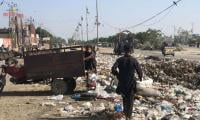As the country’s politics gets increasingly focused on Punjab and the Centre, the political landscape in Karachi is also undergoing a dramatic transformation.
This time, it is the MQM that is set to make a powerful comeback. All factions of the MQM have decided to join forces, creating a picture that has never been seen before and illustrating that Karachi politics is about to become a major talking point.
As the issues of political representation, poverty, education and health, as well as marginalised communities, began to rise, MQM emerged in response. It was evident that the youth of Karachi were not being given a platform to engage in decision-making and to ensure their voices were heard. Furthermore, the benefits of development funds were not being adequately distributed.
In a surprising move, the MQM factions and Pak Sarzameen Party (PSP) joined hands, as announced by the Sindh Governor Kamran Tessori. An experienced hand himself, Governor Tessori mediated and pulled them into a single direction towards unification.
The Governor has taken upon the challenge of unifying the MQM and its leadership which has been in disarray for a long time. He invited PSP’s President Mustafa Kamal to join in. Additionally, the factions led by Khalid Maqbol Saddiqui and Farooq Sattar have been brought in under one tent. In order to form a truly united MQM Pakistan, other main workers are also being sought.
Currently, the division of labour has been determined: Farooq Sattar will be responsible for political matters, and Mustafa Kamal will oversee administrative affairs. Anis Qaimkhani will be in-charge of organisational matters. And Khalid Maqbool Siddiqui will be the party head.
Those who have been overlooked will be enlisted in the party’s cause. There are also plans to trim the Rabta Committee, which currently has around 50 members.
MQM is aiming to revolutionise the electoral politics of Karachi, giving the PPP a run for its money. It is hoping to secure at least 50 seats in the Sindh Assembly and 15 seats in the National Assembly, potentially having a significant impact on the composition of the federal government. It remains to be seen whether it actually achieves this goal though.
The main challenge now is a) to rally the grass-roots party workers and b) a mechanism that prevents the emergence of “bata” (extortion) culture.
To this end, two streams of thought have emerged: all properties in London will belong to MQM (P), with the proceeds and rent being used to fuel party machine and support the families of martyrs. Additionally, the Karachi business community is expected to fund the election campaigning of MQM, taking it seriously as a viable political force.
MQM is hopful of putting an end to the space and appeal left by MQM London, sending a clear message to Karachi that the era of Altaf Hussain is over and that they must take MQM seriously.
This is especially pertinent given the numerous challenges that Karachi is currently facing. Governor Tessori is doing his utmost to make MQM a formidable political force in Karachi, and is taking steps to bring about much-needed development and progress by working closely with the Sindh government. The newly-appointed administrator of Karachi, for example, has been appointed on his recommendation. Furthermore, two coordinators to the CM (with portfolios) have been appointed at his request. He is also striving to make Karachi a safe and secure place to live and work by improving public transportation and reducing crime.
MQM is also looking to broaden its appeal to other ethnic groups in Karachi by engaging in more inclusive local-level political activities and programmes that are beneficial to all citizens, regardless of their ethnicity or socio-economic status. After all, Karachi is becoming a multi-ethnic, cosmopolitan city, and to limit the MQM to one ethnic group, as it was in the past, would be a reductionist strategy.
MQM is also strategising to build bridges with other political parties, religious and non-religious groups. This includes hosting public forums to discuss issues such as poverty, inequality and lack of opportunity, as well as initiatives to promote education and job training.
One focus of the PTI narrative is to blame the establishment for supporting the MQM, which is nothing more than hot air. The only red line for the state is that there must be no return to the pre-2013 era of terrorism and “bata” culture in Karachi. This means that no space will be given to the MQM London.
Realpolitik dictates the PPP may tacitly accept this new political phenomenon. The main reason is that the PPP has some support and cannot attract MQM voters. So, any void left by the MQM’s power struggle means that there is room for PTI, JI and TLP. That is the last thing the PPP wants, so it can easily reconcile with the MQM revival.
There are many who believe the coming together of MQM factions does not portend the future. However, MQM is on the horizon, and it is set to revolutionise the political landscape of Karachi. With the backing of the Governor, the unification of the MQM factions, and the support of the business community, MQM is poised to make a major impact on the electoral politics of Karachi.
The PPP may have a tough time and could even have a major effect on the composition of the federal government in the next general elections.
It remains to be seen how the party will galvanise its workers, its voters and how it will use the proceeds from its London properties to support its campaign. One thing is certain: MQM is here to stay.
Jan Achakzai is a geopolitical analyst, a Balochistan politician and a former media and strategic communications advisor to GOB. He tweets @jan_Achakzai.
SC releases roster of Constitution Bench for next week starting Monday, November 25
IGP issues directives to all regional and district police officers as well as heads of different wings
Rear Admiral completed various professional courses from national and international institutes
Court also issues non-bailable arrest warrants for Raja Rashid Hafeez, Wasiq Qayyum and others
Jonathan says Pakistani people deserve to live free from harm, and threat, feel protected in their daily lives
Indian media reports suggest that meeting will follow conclusion of BCCI officials’ commitments in Saudi Arabia







